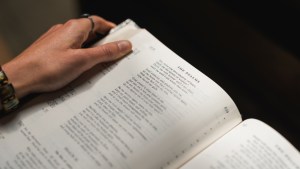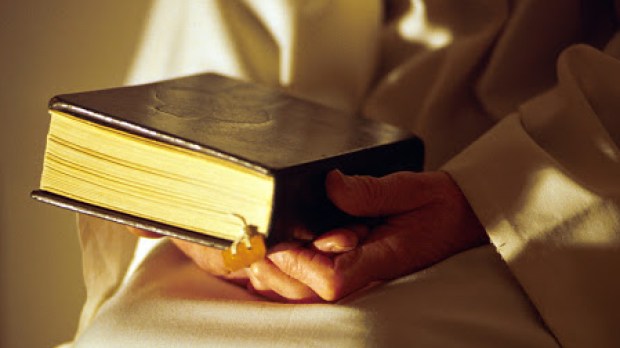There is something striking about being a member of a universal Church, a Church that is present throughout the world, that prays in scores of languages. Each time we go to Mass, we join with millions of other people who are attending the same Mass that day.
The Liturgy of the Hours is the same way. Right now, as you’re reading this, thousands of people are praying vespers, the evening prayer of the Church. Thousands more are praying morning prayer, and still more one of the other offices of the Liturgy of the Hours. There is no moment when the Liturgy of the Hours is not being prayed. The Church on which the sun never sets is held up by the prayers of her people, by the hundreds of thousands of priests and religious who are bound to pray the Office and by the hundreds of thousands of laypeople who have responded to the Church’s invitation to join in this, the prayer of the Church.
As the Catechism tells us, liturgy is an “action” of the whole Christ. Jesus, our high priest celebrates it unceasingly in the heavenly liturgy, with the holy Mother of God, the apostles, all the saints, and the multitude of those who have already entered the kingdom. On earth, as members of Christ, we participate in this.

Read more:
A beginner’s guide to the Liturgy of the Hours
The Liturgy of the Hours (often referred to as the Divine Office or merely the Office) is made up of hymns and canticles, prayers and readings. There’s a four-week cycle with different antiphons for different seasons and prayers corresponding to certain feast days, all of which adds up to over a million people joining each Monday night to pray, “O Lord, our God, unwearied is your love for us” and to crying out, “Lord, why do you reject me? Why do you hide your face?” every Friday.
I learned to pray the Office on the school bus on the way to my public high school, one of the boys from my youth group showing me how to set the ribbons in the prayer book and where to flip. It’s rather a baffling setup if you don’t have someone to teach you (though there are various apps that will find all the proper texts for you) and it honestly didn’t do much for me. So I prayed it off and on for a few months and let it fall by the wayside.
Some years later, I was discerning religious life and decided that I really ought to get in the habit of praying the Office. Though it still wasn’t my favorite approach to prayer, there was something about the discipline of it that spoke to me, the fact that I had to turn to God throughout the day, that I couldn’t frontload my day with prayer and have the rest of the day to myself. Instead, I prayed morning prayer when I woke up, evening prayer at dinnertime, night prayer before bed, and the Office of Readings somewhere in there as well. Many people also pray three midday offices, their day punctuated by prayer at least seven times.
As the Liturgy of the Hours became a constant feature of my life, I began to see how very united I am to all the Church through this prayer. On Thursday morning, I pray the same Psalms that diocesan priests in Nagasaki prayed hours before, that Carmelites in Kolkata prayed, that a parish group in Edinburgh prayed, that seminarians in Berkeley are praying, that missionaries in Honolulu will pray.
I pray words of hope when I feel near despair. I pray psalms of anguish when I feel fairly peaceful. Every day I pray words that don’t match my feelings, but I pray alongside (and on behalf of) those who may be feeling the agony of Friday night prayer or the joy of Sunday. I stand united with every member of the Church, those who pray the Office and those who don’t, and pray as part of a body.
As a rule, I much prefer personal prayer: quiet, undirected time where I choose the subject of my meditation or flip through a book that I’m interested in. I don’t like being told what to do or what to pray. I don’t pray as well in a group as I do alone. But there is powerful grace in the obedience that comes with the Liturgy of the Hours, with submitting my will to the will of the Church and praying Psalms that I don’t care for or reading passages that don’t touch me. And making the commitment to pray the Office faithfully has a transformative effect.

Read more:
3 Steps to praying the Psalms, and finding hope in our darkness
Perhaps best of all, each liturgical hour stands alone, so you don’t have to add two hours of prayer to your day to give it a try. Night prayer is a beautiful way to end the day and takes less than 10 minutes, while morning prayer will orient your whole day to the Lord.
Download a free app and try praying just one of the hours each day, in union with over a million other Catholics who are doing the same thing. You may find that this ancient monastic prayer makes you more fully yourself.

